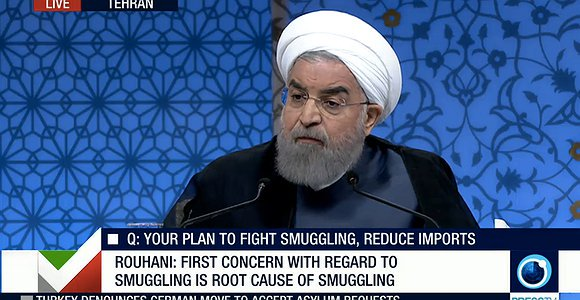Iran’s six Presidential candidates met in their third and final debate on Friday, a week before the May 19 first-round vote.
President Rouhani and his two main challengers, hardline cleric Ebrahim Raisi and conservative Tehran Mayor Mohammad Baqer Qalibaf restaked their positions. Rouhani claimed economic recovery after the July 2015 nuclear deal with the 5+1 Powers. Raisi and Qalibaf said the Government had failed to raise productivity and ease poverty, and each promised again to provide millions of jobs during a four-year term in office.
Qalibaf also repeated his populist tactic labelling Rouhani as the head of the “Government of the 4%”, while Raisi cited the closure of factories and layoffs in “the production sector”. Rouhani challenged his opponents to explain how they would fund their declarations of mass increase in employment while avoiding renewed inflation, which has fallen from more than 40% to less than 9% since the President took office in August 2013.
Once again, 1st Vice President Eshaq Jahangiri provided support for Rouhani, criticizing elements within the regime for not dealing with smuggling and pressing Raisi and Qalibaf on their records. The Tehran Mayor hit back with the claim that “some Government officials” are involved in smuggling, while Raisi maintained that he would combat the illegal trade with a plan “based on extensive research conducted in universities”.
Rouhani also took on the issue of Iran’s cumbersome banking and financial sector, which is continuing to restrict foreign investment after the implementation of the nuclear deal. Declaring the need for fundamental reforms, he asserted his expertise with the claim that capital of state-run banks has been doubled.
Raisi countered with a general promise to increase subsidies, a reversal of Iranian Government policy since the Ahmadinejad Government pursued a sweeping — and problematic — plan in December 2010 to reduce the support for purchases of food, gasoline, and energy. Qalibaf again declared that Iran is “facing full-fledged economic crisis and that he can create five million jobs.
Rouhani Positions Himself v. Regime Hardliners
Beyond the economic issues, Rouhani continued to position himself as the challenger to hardliners within the regime who are repressing Iranians.
Responding to Raisi’s accusations of corruption within the Government, including Rouhani’s brother and advisor Fereydoun, the President linked his opponent with the judiciary and its suppression of political and social freedoms.
“You can make any accusations you want against me. You’re a judge, your [options] are open, you can do anything you want,” Rohani told Raisi, a former Attorney General.
Rouhani continued, “You’re also prosecutor of the Special Court for Clergy, you can detain any cleric. We have to ask clerics what they have gone through at your hands.”
That was another reference to Raisi’s role in the execution of about 5,000 Iranians in 1988 in a crackdown on dissent and political and religious opponents.
While Rouhani refrained from more criticism of the Revolutionary Guards, he said security services are supporting Raisi, who is also seen as the choice of the Supreme Leader’s office.
The President countered Qalibaf’s claims of corruption with allegations that the Tehran Mayor has his own secrets —
“The 2005 Qalibaf file was in my hands, and I blocked its publication. If I had allowed its publication, you would not be here today” — and he noted that Qalibaf has called for a crackdown on students protesting for more rights.
As the head of Tehran police, Qalibaf led the suppression of widespread protests at Tehran University and other institutions in 1999.

